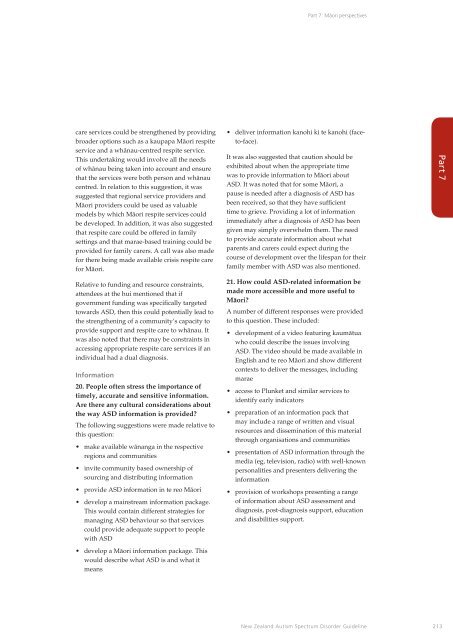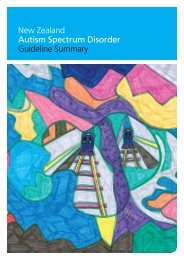New Zealand Autism Spectrum Disorder Guideline - Ministry of Health
New Zealand Autism Spectrum Disorder Guideline - Ministry of Health
New Zealand Autism Spectrum Disorder Guideline - Ministry of Health
Create successful ePaper yourself
Turn your PDF publications into a flip-book with our unique Google optimized e-Paper software.
Part 7: Mäori perspectives<br />
care services could be strengthened by providing<br />
broader options such as a kaupapa Mäori respite<br />
service and a whänau-centred respite service.<br />
This undertaking would involve all the needs<br />
<strong>of</strong> whänau being taken into account and ensure<br />
that the services were both person and whänau<br />
centred. In relation to this suggestion, it was<br />
suggested that regional service providers and<br />
Mäori providers could be used as valuable<br />
models by which Mäori respite services could<br />
be developed. In addition, it was also suggested<br />
that respite care could be <strong>of</strong>fered in family<br />
settings and that marae-based training could be<br />
provided for family carers. A call was also made<br />
for there being made available crisis respite care<br />
for Mäori.<br />
• deliver information kanohi ki te kanohi (faceto-face).<br />
It was also suggested that caution should be<br />
exhibited about when the appropriate time<br />
was to provide information to Mäori about<br />
ASD. It was noted that for some Mäori, a<br />
pause is needed after a diagnosis <strong>of</strong> ASD has<br />
been received, so that they have sufficient<br />
time to grieve. Providing a lot <strong>of</strong> information<br />
immediately after a diagnosis <strong>of</strong> ASD has been<br />
given may simply overwhelm them. The need<br />
to provide accurate information about what<br />
parents and carers could expect during the<br />
course <strong>of</strong> development over the lifespan for their<br />
family member with ASD was also mentioned.<br />
Part 7<br />
Relative to funding and resource constraints,<br />
attendees at the hui mentioned that if<br />
government funding was specifically targeted<br />
towards ASD, then this could potentially lead to<br />
the strengthening <strong>of</strong> a community’s capacity to<br />
provide support and respite care to whänau. It<br />
was also noted that there may be constraints in<br />
accessing appropriate respite care services if an<br />
individual had a dual diagnosis.<br />
Information<br />
20. People <strong>of</strong>ten stress the importance <strong>of</strong><br />
timely, accurate and sensitive information.<br />
Are there any cultural considerations about<br />
the way ASD information is provided?<br />
The following suggestions were made relative to<br />
this question:<br />
• make available wänanga in the respective<br />
regions and communities<br />
• invite community based ownership <strong>of</strong><br />
sourcing and distributing information<br />
• provide ASD information in te reo Mäori<br />
• develop a mainstream information package.<br />
This would contain different strategies for<br />
managing ASD behaviour so that services<br />
could provide adequate support to people<br />
with ASD<br />
• develop a Mäori information package. This<br />
would describe what ASD is and what it<br />
means<br />
21. How could ASD-related information be<br />
made more accessible and more useful to<br />
Mäori?<br />
A number <strong>of</strong> different responses were provided<br />
to this question. These included:<br />
• development <strong>of</strong> a video featuring kaumätua<br />
who could describe the issues involving<br />
ASD. The video should be made available in<br />
English and te reo Mäori and show different<br />
contexts to deliver the messages, including<br />
marae<br />
• access to Plunket and similar services to<br />
identify early indicators<br />
• preparation <strong>of</strong> an information pack that<br />
may include a range <strong>of</strong> written and visual<br />
resources and dissemination <strong>of</strong> this material<br />
through organisations and communities<br />
• presentation <strong>of</strong> ASD information through the<br />
media (eg, television, radio) with well-known<br />
personalities and presenters delivering the<br />
information<br />
• provision <strong>of</strong> workshops presenting a range<br />
<strong>of</strong> information about ASD assessment and<br />
diagnosis, post-diagnosis support, education<br />
and disabilities support.<br />
<strong>New</strong> <strong>Zealand</strong> <strong>Autism</strong> <strong>Spectrum</strong> <strong>Disorder</strong> <strong>Guideline</strong> 213











